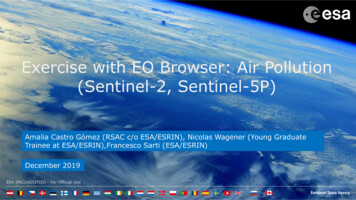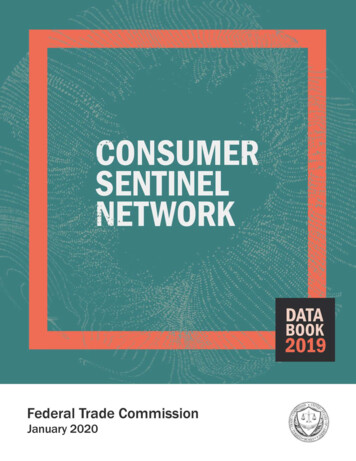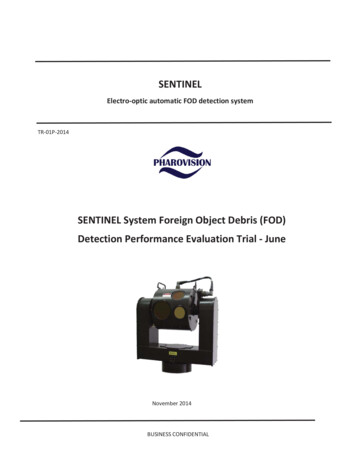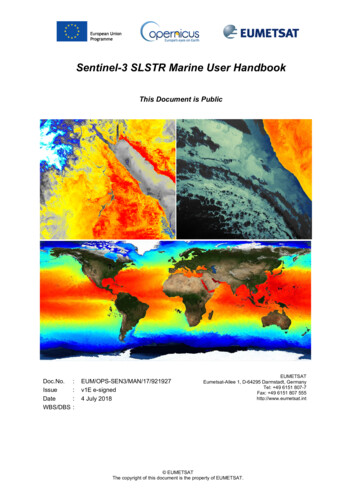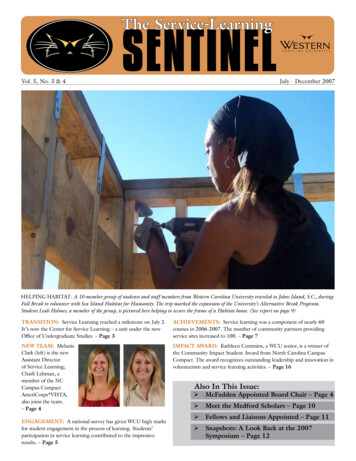
Transcription
Vol. 5, No. 3 & 4SENTINELJuly - December 2007HELPING HABITAT: A 10-member group of students and staff members from Western Carolina University traveled to Johns Island, S.C., duringFall Break to volunteer with Sea Island Habitat for Humanity. The trip marked the expansion of the University’s Alternative Break Program.Student Leah Holmes, a member of the group, is pictured here helping to secure the frame of a Habitat house. (See report on page 9)TRANSITION: Service Learning reached a milestone on July 2.It’s now the Center for Service Learning – a unit under the newOffice of Undergraduate Studies. – Page 3ACHIEVEMENTS: Service learning was a component of nearly 60courses in 2006-2007. The number of community partners providingservice sites increased to 100. – Page 7NEW TEAM: MelanieClark (left) is the newAssistant Directorof Service Learning;Charli Lehman, amember of the NCCampus CompactAmeriCorps*VISTA,also joins the team.– Page 4IMPACT AWARD: Kathleen Cummins, a WCU senior, is a winner ofthe Community Impact Student Award from North Carolina CampusCompact. The award recognizes outstanding leadership and innovation involunteerism and service-learning activities. – Page 16ENGAGEMENT: A national survey has given WCU high marksfor student engagement in the process of learning. Students’participation in service learning contributed to the impressiveresults. – Page 5Also In This Issue:ØMcFadden Appointed Board Chair – Page 4Ø Meet the Medford Scholars – Page 10Ø Fellows and Liaisons Appointed – Page 11Ø Snapshots: A Look Back at the 2007Symposium – Page 121
Indicators of EngagementEngagement is permeating the WCU campusand is now a definitive characteristic of ourinstitution.Engaged teaching Engaged learning Student-faculty engagement. Civicengagement. Regional engagement. Faculty,staff, students, and alumni are now marching tothe beat of the engagement drum.Our University’s commitment to engagedlearning earned high marks in a recentreport from the National Survey of StudentEngagement (NSSE). Results from NSSEindicate that WCU students are moreacademically engaged than their peers atcolleges and universities across the UnitedStates.At WCU, we define engaged learning as “theintegration of purposeful academic and cocurricular activities to equip students with theintellectual and experiential skills necessary forsuccess in life beyond college.” An impressivepercentage of students become academically andcivically engaged through service learning.Community-based learning opportunities canbe found across the entire curriculum. It is asmuch the concern of the arts and humanities,the natural sciences, technical disciplines,pre-professional studies, and interdisciplinaryprograms as it is of the social sciences.In November, twenty-five faculty membersreceived the Chancellor’s Meritorious Awardfor Engaged Teaching. Furthermore, ourUniversity’s tenure, promotion, and retentionguidelines now reward the range of scholarlyactivities – discovery, integration, application,and teaching – proposed in 1990 by thelate Ernest Boyer, President of the CarnegieFoundation for the Advancement of Teaching.Chancellor Bardo, our “drum major,” hasconsistently articulated the institution’s deepcommitment to community engagement.Back in August 2005, he said: “I anticipatethat engagement will become a definingconcept for our University as we addressthe requirements by SACS to create a QualityEnhancement Plan.” In August 2007, he gavea variation on the theme as he underscored theUniversity’s role as a “steward of place” for theWestern NC region.There are many indicators of engagement atWCU. Faculty and students alike are engagedin helping to solve problems and improve livesthroughout the region. As Provost Kyle Carternoted recently, “Regional engagement is at thecore of Western’s mission, and we relish theopportunity to meet that demand.”– Glenn Bowen2 The Sentinel, July – December 2007What they’re saying . I enjoy encouraging students and others to solveproblems, lead effectively and think of ways to make theworld a better place. Students need to develop the skillsto think for themselves, and this involves critical reflectionas well as being challenged by challenging assignments. Myclasses use service learning as a way students can get directlyinvolved in community problem solving.– Dr. Gordon Mercer, Professor of Political Science andDirector of WCU’s Public Policy Institute, quoted in theAsheville Citizen-Times (November 14, 2007) Thank you for giving me space in the [WCU ServiceLearning Symposium] program [on June 14] to presentMercerthe work we are doing at UK-Landscape Architecture. Theorganization of the entire experience was really well doneand a credit to you and all the people that made the event a joy to attend.– Brian D. Lee, Ph.D.,Department of LandscapeArchitecture, College ofAgriculture, University ofKentucky [The servicelearning project was] atremendous knowledgeand experience builderfor me. I really enjoyedactually administering apsychomotor test, insteadof just learning about it. Itis a great confidence builderto apply new knowledge toa task. With the CullowheeValley [School] experience,I learned how to collect datawhen administering a test. Ialso learned a little bit aboutmyself. I became a moreconfident person.– Matthew Golden, a studentin Dr. David Claxton’sPhysical Education (PE 311)course in Spring 2007n County, Inc.REACH of MacoP.O. Box 2284Franklin, NC 287407November 11, 20Dear Dr. Bowenstudentsu, your staff, andI want to thank yoence”ferdifaead“mainwho have once agrd our children. Oufor our shelter anour shelterdaner,safwnoplayground iscleaner!Makerk and energy [onThe volunteers’ wos.oundmetrewasa Difference Day]rat you all do for ouThank you for whcommunity.Sincerely,, M.S., Ed.S.Ann VanHarlingentorrecDietivExecu I think it’s very important togive back to the community,whether it is for school or backhome. It is very important to get experience so you’ll be ready for your career. Theexperience we gained was a lot, and I wish there were a whole lot more opportunitieslike that at Western.”– Laura Corriher, a Recreation Therapy student who participated in a “Senior Prom”at the Mountain Trace Nursing Center in Spring 2007The Service-Learning Sentinel is a publication of theCenter for Service Learning,Western Carolina University. Center for Service Learning, 2007Scott East, Western Carolina UniversityCullowhee, NC 28723Telephone: 828-227-7184; Fax: 828-227-7179http://www.wcu.edu/studentd/service learning
Service Learning Moves to Academic AffairsService Learning was transferredfrom the Student Affairs Divisionto Academic Affairs on July 2.With the transfer of the ServiceLearning Department, this unit hasbeen formally renamed the Center forService Learning.The University of North CarolinaBoard of Governors approved the“center” designation in 2003, the yearthat the Service Learning Departmentwas established in Student Affairs. Thename was adopted when the transfertook place.“This classification, as aninstitutional research center, reflectsour university leaders’ appreciation ofthe value of service learning as both apedagogical strategy and an avenue forscholarly research,” said Glenn Bowen,Director of Service Learning.The Center for Service Learning isnow an administrative unit of the newOffice of Undergraduate Studies. CarolBurton, who was appointed AssistantVice Chancellor for UndergraduateStudies, effective also on July 2, hasoversight of Service Learning.Dr. Kyle Carter, Provost andSenior Vice Chancellor, announcedthat the new Assistant Vice Chancellorposition was established to coordinateimplementation of key elements ofundergraduate education, includingthe Liberal Studies Program. Thenew position is also responsible forimplementing the Quality EnhancementPlan (QEP), a comprehensive plandeveloped as part of the SACS(Southern Association of Colleges andSchools) review for the reaffirmation ofinstitutional reaccreditation.Service learning is an integralrelated skills, and become responsiblecitizens.”The Center’s programs includeAlternative Breaks, Days of Service,Civic Place (residential learningcommunity), Awards and Recognition,and a Community Service-LearningFair. Services include consultations, aAssistant Vice ChancellorCarol Burton has oversightof the Center; Glenn Bowenis the Director.component of the QEP, designed tosupport student engagement and fostersynthesis as the “pathway to intentionallearning” at Western.At Western, service learning isdefined as “a teaching and learningstrategy that integrates communityservice with academic instruction andstructured reflection in such a way thatstudents gain further understandingof course content, meet genuinecommunity needs, develop career-listserv, and faculty workshops. FacultyFellows and Medford Scholars (studentreflection leaders) support the work ofthe Center.Dr. Burton has appointed a17-member Advisory Board for theCenter. Anna McFadden, Director ofthe Coulter Faculty Center, is Chairthe Board, which is composed offaculty, staff, students, and communityrepresentatives.Mission StatementThe mission of the Center for Service Learning at Western Carolina University is to promoteservice learning as a special form of experiential education whereby students engage inorganized activities designed to enhance their understanding of course content, meet genuinecommunity needs, develop career-related skills, and become responsible citizens. The Center willorganize and manage a comprehensive program in collaboration with faculty, administrators,staff, students, and community partners to encourage academic excellence, promote studentand faculty engagement, and foster civic responsibility.The Sentinel, July – December 20073s
New Assistant Director . . .The Center for Service Learning welcomed Melanie Clarkas the new Assistant Director on September 17. Shehas primary responsibility for the coordination of cocurricular programs and related projects.Ms. Clark earned a B.A. in Sociology from DePauw Universityin Greencastle, Indiana, and a Master’s in Social Work from theUniversity of Denver in Colorado.She previously served as the Director of Leadership andCommunity Service at the University of North Carolina atPembroke (UNCP). Under her leadership, UNCP began to buildan infrastructure to utilize service learning as a teaching and learningmethod. She advised the Leadership & Service OpportunitiesProgram in which enrollment increased dramatically from 50 tonearly 900 students over a six-year period.Ms. Clark’s responsibilities as theAssistant Director of Service Learningat Western include supervision of theMedford Scholars, oversight of CivicPlace, and coordination of the Days ofService. She is an advisor to the PlanningCommittee for Alternative Spring Break.“I am thrilled to join WesternCarolina University, the team of servicelearning professionals, students, and thecommunity in furthering the mission ofengagement,” she said.Clark. . . And Program CoordinatorCharli Lehman, a member of the AmeriCorps*VISTA(Volunteers in Service to America), joined the staff of theCenter for Service Learning on July 30. She will serve asProgram Coordinator in the Center for Service Learningfor one year.Ms. Lehman is participating in the VISTA program sponsoredlocally by North Carolina Campus Compact. Twenty-one NorthCarolina campuses have VISTA members this year.A native of Southwest Indiana, Ms. Lehman is a recent graduateof Butler University in Indianapolis, where she received a B.A. inJournalism, with a Public Relations concentration, and Sociology.She was active on campus as a leader in Student Government, GreekLife, volunteer projects, and servicelearning. At Butler, she also worked as theIntern to the Vice President of StudentAffairs.Here at Western, Ms. Lehmanis working primarily with studentorganizations, offering support asthey plan their own service and civicengagement projects.“I am excited to be spending this yearas a Catamount,” she said. “I am reallyenjoying my work with students, faculty, andstaff here at WCU.”LehmanAdvisory Board Appointed for CenterA 17-member Advisory Board has been appointed for theCenter for Service Learning. Anna McFadden, Directorof the Coulter Faculty Center and Professor in theDepartment of Educational Leadership and Foundations,is chairing the Board.“I am honored and pleased to serve as Chair of the ServiceLearning Advisory Board,” Dr. McFadden said. “Without a doubt,service learning has the potential to fully engage students inmeaningful learning experiences and to help us effectively implementWCU’s QEP.”The Board for the 2007-2008 academic year is composed ofthree faculty members, three staff members from Academic Affairs(including Enrollment Management) and four from Student Affairs,a representative from the Institute for the Economy and the Future(IEF), three students, and three community partners.In announcing the appointments, Assistant Vice ChancellorCarol Burton noted that the Board would support the Center inenhancing and promoting Service Learning at WCU. “Specifically,”she added, “the Board will review the service-learning program,recommend policies and procedures pertaining to service learning,and assist in creating quality relationships among campus andcommunity stakeholders.”The Board later elected Jeffrey Zelenka, Director of the Officeof Sponsored Programs at the IEF, as Vice Chair. Glenn Bowen,4The Sentinel, July – December 2007Director of Service Learning, is Secretaryof the Board.Other Board members are Rachel All,student, WCU; Mardy Ashe, Directorof Career Services and CooperativeEducation, WCU; Jimmi Buell, HealthPromotion Coordinator, JacksonCounty Department of Public Health;James Contratto, Assistant Director forPrograms – Hinds University Center,WCU; Katherine Graunke, student/McFaddenMedford Scholar, WCU; Glenda Hensley,Visiting Assistant Professor – Departmentof Stage and Screen, WCU; Lynn Mathis, Coordinator of ResidentStudent Success – Department of Residential Living, WCU; TimaraMcCollum, Executive Director, The Community Table; GarrettRichardson, student, WCU; William (Bill) Richmond, Ph.D.,Associate Professor – Computer Information Systems, WCU;Sara Stoltenburg, Director of the Women’s Center, WCU; JoyceRussell, Executive Director, Jackson County Habitat for Humanity;Walter Turner, Director of Student Judicial Affairs, WCU; andElizabeth (Beth) Walden, Instructor, Philosophy and Religionand International Student Advisor – International Programs andServices, WCU.
National Survey GivesWCU High Marks forStudent EngagementTwenty-onepercent ofWestern CarolinaUniversity firstyear studentsparticipated in aservice-learningactivity as part ofa course last year,compared to 13percent at peerinstitutions and 12percent nationally,the latest National Survey of Student Engagement(NSSE) has revealed.Western’s efforts to ensure that students are fully engagedin the process of learning, both inside and outside theclassroom, earned high marks on the survey measuring thequality of undergraduate education.The survey also found that 24 percent of WCU seniors tookpart in service learning, compared to 20 percent at peerinstitutions and 17 percent nationally.“The results are impressive,” commented Carol Burton,Assistant Vice Chancellor for Undergraduate Studies.NSSE results released November 5 indicate that WCUstudents are more academically engaged than their peersat colleges and universities across the United States. The2007 NSSE (pronounced “Nessie”) report is based oninformation from 323,000 randomly selected first-year andsenior students at 610 four-year colleges and universities inthe United States and Canada.The report shows that Western outperformed 17 peerinstitutions of similar size and mission (as categorized bythe Carnegie Foundation for the Advancement of Teaching)in all five benchmark categories – active and collaborativelearning, student-faculty interaction, level of academicchallenge, supportive campus environment, and enrichingeducation experiences.Melissa Wargo, Director of Assessment, noted: “Comparedto all colleges in the survey, regardless of their size andmission, we scored better on level of academic challenge,active and collaborative learning, student-faculty interaction,and supportive campus environment.”WCU to be Featured inService-Learning BookBy Jessica CreggerWCU Office of News ServicesWestern Carolina University has been selectedto appear in a service-learning guidebook forprospective college students, scheduled to be on shelvesthroughout the nation within the next few months.The inaugural Guide to Service-Learning Colleges andUniversities, published by a division of Student Horizonsin Bethesda, MD, will feature nearly 300 colleges anduniversities across the United States that integrate servicelearning within their curriculum. Western is one of 13North Carolina schools to be featured in the book.“We’ve had conversations with colleagues from institutionsall over the United States, and Western Carolina wasmentioned several times regarding its quality of servicelearning,” said Kelly Lightfoot, Marketing and SalesManager at Student Horizons.A form of experiential education that integrates communityservice and classroom instruction, service learning enhancesstudents’ academic development while fostering social andcivic responsibility, said Glenn Bowen, Director of ServiceLearning at Western.Service learning is a component of some 60 coursesat Western. In addition to serving the surroundingcommunity, students can travel to foreign countries onan “Alternative Spring Break,” such as a visit in 2006 toPanama. Western also offers scholarships for students,workshops and fellowships for faculty, and an annualService-Learning Symposium attended by representatives ofhigher education institutions throughout the Southeast.“We are delighted that WCU will be featured in whatpromises to be an impressive publication,” said Dr. Bowen.“It signals recognition of the significant strides beingmade by our faculty in integrating community service withcoursework, our students’ academic and civic achievements,and our institution’s commitment to engagement with thecommunities of our region.”For first-year students, WCU was among the top 50 percentnationally for active and collaborative learning, and studentfaculty interaction.The Sentinel, July – December 20075s
WCU’s Improvement Plan Will Benefit Region and Campus,Chancellor SaysBy Bill StudencWCU Office of News ServicesAcomprehensive institutional improvementplan developed for Western CarolinaUniversity’s reaccreditation process and a newtenure policy rewarding faculty members forsharing scholarly expertise with the regionwill help shape the future of Western NorthCarolina while guiding the direction of theUniversity.In his annual Opening Assembly addresson August 15 to kick off the academic year,Chancellor John W. Bardo told WCU faculty,Chancellor Bardo speaks at the Opening Assembly. (Photo: Mark Haskett)staff, and students that implementing the Qualityfocused on the concept of educational synthesis – that is,Enhancement Plan (QEP) and tenure policy changes willenhancing undergraduate student learning by linking theresult in a University that is a “steward of place” for thediverse elements of the entire University experience, in andregion.out of the classroom, and helping students connect their“As we work on our most important activities, we willacademic and co-curricular experiences in order to betterneed increasingly to weave them into one institutionalreach their goals after graduation.tapestry that is defined by our Quality Enhancement Plan,”Through such educational activities as student serviceChancellor Bardo said. “This Plan has to be the University’slearning projects, faculty research into subjects of importancefocus, and it gives us a unique and very important positioningto WNC, and institutional outreach and service efforts, allwith regard to the future of our students, our region, ourunder the umbrella of the QEP, the University will become astate, and in large measure, the future of higher educationbetter steward for the region in which it is located, Dr. Bardonationally.”said.A requirement for reaccreditation by the SouthernAssociation of Colleges and Schools, Western’s QEP isWCU Provides Over 16,000 Hours of Community Service for HomecomingWestern Carolina University students,faculty, and staff members completed16,600 hours of service to localcommunities as part of Homecoming2007, exceeding the 10,000-hour goal.The University’s HomecomingCommittee expanded the traditionalday of service this year to the monthbefore the Homecoming football gameand invited all members of the WCUFamily to participate.“Students, alumni, faculty, and staffdemonstrated exemplary responsivenessand responsibility as good neighbors,”remarked Glenn Bowen, Director ofService Learning. “We should feeljustly proud of not only the number ofhours of service we gave but also thequality of our contributions.”Members of WCU’s Pride of the6The Sentinel, July – December 2007Mountains Marching Band conducteda marching band clinic in Asheville andhosted a high school band competitionon campus.Dean Brian Railsback and HonorsCollege students helped to organizethe Smoky Mountain Book Fair.Many students participated inprojects that allowed them to applytheir classroom knowledge to assist thecommunity. For example, Art studentspainted murals and taught classes atvarious sites, including the PigeonCreek Community Center, a nursinghome, a Girl Scout camp, and an areahigh school. Students in a BroadcastCommunications class created publicservice announcements for Pathwaysfor the Future, a Sylva-based nonprofitorganization that serves individualswith disabilities.Staff members assisted with youth/sports organizations, managed a yardsale to benefit a cancer patient, andhelped lay foundation and flooringfor a Habitat for Humanity house.Volunteers also assisted with theClothesline Project, organized by theWomen’s Center, to raise awareness ofthe issue of violence against women.The WCU Eco CATS(Conservation Awareness Team forSustainability), led by WCU EnergyManager Lauren Bishop, contributed20 hours of service related to trashdisposal. WCU volunteers furthercontributed 40 hours of servicethrough an American Red Cross BloodDrive on campus.Members of the Women’s
“A Year of Solid Achievements”Service learning was a component ofnearly 60 courses last academic year.The number of community partnersproviding service sites increased to 100.“It was a year of solid achievements,”the Service Learning Department reportedin May.Through co-curricular volunteer workduring the 2006-2007 academic year, WCUstudents contributed 985 hours of servicevalued at approximately 19,800. Over600 students participated in the Tuck RiverCleanup, our National and Global YouthService Day project.The Service Learning Departmentenrolled 18 students in the NC-ACTS!AmeriCorps Program through which theyprovided over 5,000 hours of communityservice and received 18,000 in educationalawards. (NC-ACTS is the acronym forNorth Carolina – Activating Citizenshipthrough Service. North Carolina CampusCompact and AmeriCorps co-sponsor theprogram.)The Service Learning Departmenthosted the 3rd Annual WCU ServiceLearning Symposium, featuring Dr. Richard(Rick) Battistoni, a national expert oncivic engagement, with 73 participantsfrom eight states; the 3rd Annual ServiceLearning Awards Ceremony at which 46students and three student groups, eightfaculty and five staff members, as well assix community partners, were recognizedfor their contributions and achievements;and the 2nd Annual Community ServiceLearning Fair with 34 community agenciesand four campus departments/programsparticipating.Service learning was incorporated into57 courses, compared to 49 last year – a 16percent increase. Forty-one faculty memberstaught these courses.In addition, the number of communitypartners rose to 100, from 88 last year – a12 percent increase.In addition, the Service LearningDepartment made extensive contributionsto the development of the University’s newQuality Enhancement Plan; launched CivicPlace, the 19-member residential learningcommunity; provided leadership for theBY THE NUMBERS415710062298518,00019,800Faculty members whose coursesincorporated service learningCourses with a service-learningcomponentCommunity Partners across theregionVolunteers participating in National& Global Youth Service DayHours of service rendered by WCUstudentsDollar value of education awardsreceived by NC-ACTS membersDollar value of service rendered byWCU studentsWCU Committee on Student Learning;enhanced the Faculty Fellows Programthrough a series of faculty developmentseminars and the Medford Scholars Programthrough training in facilitating reflection;and supported the work of the FacultyLearning Community on Service Learning.The Department also sponsored astudent, Katie Graunke, who was selectedas an inaugural winner of NC CampusCompact’s Impact Award and subsequentlyas a national finalist for the Howard R.Swearer Humanitarian Award.By Charli LehmanBasketball Team took a trip toJonathan Valley Elementary School inWaynesville, where they read to thechildren in support of the school’swinter reading program. The teammembers also conducted recreationalactivities for the children.Other projects involved servingmeals and assisting with grant writingat The Community Table (JacksonCounty’s soup kitchen), and providingservice as part of WCU’s MountainHeritage Day.Individuals who contributedto meeting the community servicegoal include Bobby Applewhite, PatBaker, Ruby M. Banerjee, CarollBrown, Louis Buck Jr., Ronald L.Bumgarner, James Busbin, MelanieClark, Michelle Cooper, Ben Cope,Renee Corbin, Mike Corelli, AnnetteDebo, Ramona Dowdell, Vicki Fischer,Amy K. Green, Don Guise, Vera Guise,Maurice Gullate, Linda Hambrick,Street Hamrick, Elizabeth Heffelfinger,Steve Henson, Paul Jacques, JulieJohnson-Busbin, Noelle Kehrberg,Frank Lockwood, Cindi Magill, CharlesMarth, Danell A. Moses, Mathew Rave,William Richmond, Shauna Sage, JuliaSimmons, Debby Singleton, MaryLynn Starkey, Colden Stefanisko,Marah Stefanisko, Shawn Strickland,Bill Studenc, Lucian A. Szlizewski,Walter Turner, Donna Welch, and JayneZanglein.The following groups alsoparticipated: Business Affairs and theSummit Church, College of Educationand Allied Professions, CounselingProgram in the Department of HumanServices, Cynthia Deale’s students,Eric Hendrix’s English 102 students,Hospitality and Hotel Managementstudents, Karrie Joseph and HealthServices, Kenneth Dills and theBlack Mountain Baptist Church, PEMajors Club, Phi Mu Sorority, Psi ChiHonor Society, Sigma Chi Fraternity,Small Business and TechnologyDevelopment Center, Rugby Club,WCU Faculty and Student GermanBand (Heinzelmaanchen Cats) andthe Gamelan Ensemble, WCU Men’sBasketball Team, WCU Track Team,and the WCU Women’s Rugby.– Teresa Killian (WCU Office of NewsServices) contributed to this story.The Sentinel, July – December 20077s
Make a Difference Day:WCU Groups Volunteer atSix SitesMore than 50 WCU students, faculty, and staff participated in Makea Difference Day projects on October 20 at six sites in threecounties – Jackson, Macon, and Haywood. The Center forService Learning organized the projects and the MedfordScholars were the team leaders.Photos on this page, taken by Assistant University PhotographerAshley Evans, focus on the Haywood County Habitatproject in Clyde.THOSE WHO MADE A DIFFERENCEAT PUMPKIN FEST: Katie Graunke (Team Leader), MandyCox, Courtney Cregger, Scott Hurdt, Amanda LeGaux, JennySmithAT HAYWOOD COUNTY HABITAT FOR HUMANITY:Ryan Hicks (Team Leader), Amanda Barkiewicz, Sarah Bishop,Dr. Glenn Bowen, Ali Bruce, Chris Gilbert, Prof. CharlieMarth, Orlando Martinez, Cory McCormick, Wil Owens,Ashley Reber, Mitchell Sullins, Andy Watkins, Dr. JohnWilliamsFrom Top to Bottom:Wil Owens, a perennialparticipant in serviceprojects, donned his toolbelt and got to work on the eaves of the house.Students Ryan Hicks (left) and Andy Watkins added a coat of paint tothe exterior of the Habitat for Humanity house in Clyde.Amanda Barkiewicz (left) and Ali Bruce did stucco work (rendering)on the house.Ashley Reber and Mitchell Sullins (right) helped to paint the interiorwalls of the house.8The Sentinel, July – December 2007AT R.E.A.C.H. OF JACKSON COUNTY: Anthony Ballard(Team Leader), Brandise Hawthorne, Nancy Madenyika,Shaadia Moore, Jessy Phillips, Thomas Smith, Josh Suggs,Emanual WilderAT PROJECT F.I.R.E.: Garrett Richardson (Team Leader),Michael Gastin, Brent Looney, Jared Robertson, Jared Vasold,Raynor WardAT PATHWAYS THRIFT SHOP: Ashley Merrill (TeamLeader), Kathy Boyer, Melanie Clark, Jenny Gallop, ReginaHathaway, Laura Rhinehart, Abby Stott, Emily Whittington,AT R.E.A.C.H. of Macon County: Ramona Dowdell(Team Leader), Whitley Barber, James Gregory, StephenHarris, Miranda Hosack, Waithira Koine, Patricia Mwangi,Samantha Reaves, Edna Woyee
Students, Staff Give UpVacation to Volunteerfor a servicelearning projectcalled “Projecten students and staff membersPanama”; and infrom Western Carolina2007, studentsUniversity traveled to Johns Island,participated inS.C., during the University’s Fallvarious socialBreak to volunteer with Habitat forservice projectsHumanity.in Philadelphia.The four-day trip was part of anThe recent tripAlternative Break Program, whichto Johns Islandprovides an opportunity for studentswas the first FallStudent Mindy Pickens and staff member Mike Corelli at work on a Habitatas well as faculty and staff members toBreak project.house on Johns Island, SC.spend their Fall and Spring Break time“Alternativeparticipating in meaningful servicebreak tripsand ministry dedicated to providingthrough helping communities andoffer such a unique experience – thehousing for low-income families. Theindividuals.opportunity to serve a communitythird oldest affil
1 Vol. 5, No. 3 & 4 July - December 2007 SENTINEL Also In This Issue: Ø McFadden Appointed Board Chair - Page 4 Ø Meet the Medford Scholars - Page 10 Ø Fellows and Liaisons Appointed - Page 11 Ø Snapshots: A Look Back at the 2007 Symposium - Page 12 HELPING HABITAT: A 10-member group of students and staff members from Western Carolina University traveled to Johns Island, S.C., during
